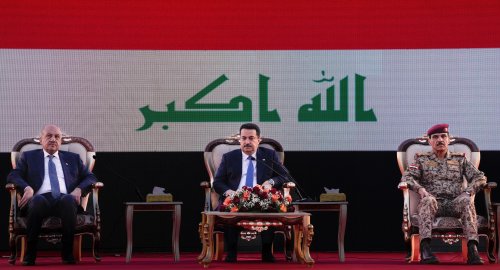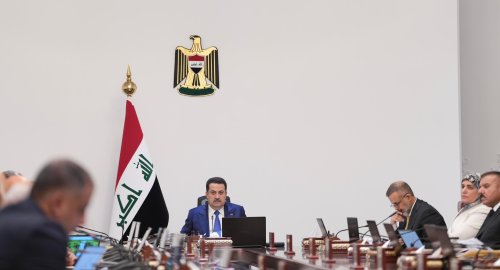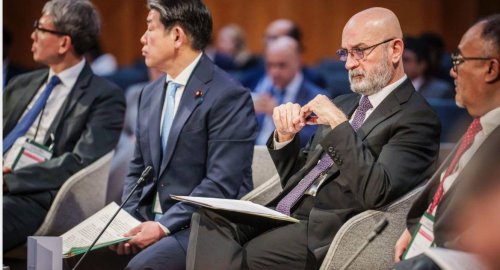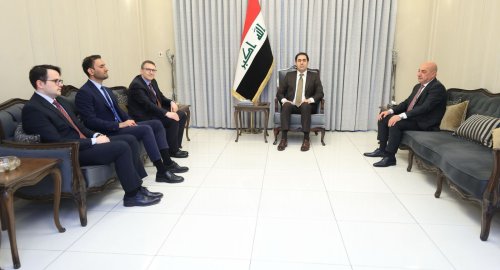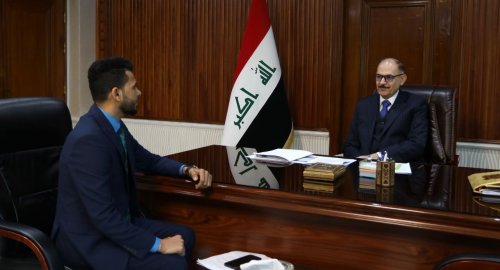
(INA) discussed the financial transfers to Kurdistan region and fighting corruption in Iraq

- 28-01-2023, 18:00
Baghdad-INA
The Federal Supreme Court issued an explanation about its decision issued regarding the financial dues that the central government sends to the Kurdistan region, indicating that the decision aims to build the state and does not target a group of society, while confirming that the Prime Minister Muhammad S. Al-Sudani has real seriousness in fighting corruption.
The President of the Federal Supreme Court, Jassem Abboud, said in an interview with the Iraqi News Agency (INA): "The court is obligated to apply the constitution and the law and take that into account in its decisions," noting that "the Federal Supreme Court is represented by its judges when it issues its decisions, as it takes into account the supreme interest of the country and the people and takes into account the principles and the noble judicial values that every judge must abide by and not transgress, and that failure to observe this distances the judicial process from the correct standards in the judiciary, which asks the court not to resolve the case at this time due to political circumstances or to resolve it in a way that violates the constitution and the law. This means asking the court to It does not take into account judicial values, which no judge accepts, because his judicial principles are a reflection of his morals and religious, educational and patriotic values .
He stressed, "Our goal is to preserve the proper application of the constitution and not to prejudice the supreme interest of the homeland and not to violate the laws that must be applied according to what is stated in them," pointing out that "the Federal Supreme Court and based on the provisions of Article (14) of the constitution, Iraqis are equal before the law without discrimination because of gender, race, nationality, origin, color, religion, sect, belief or any reason whatsoever, and that the citizens of the Kurdistan region are like the rest of the citizens of Iraq, there is no difference between the citizen who lives or resides in Zakho and there is no difference between the citizen who lives or resides in Al-Faw or anywhere else ."
He continued, "The government and the relevant authorities must search for all ways that would make the employees of the Kurdistan region equal in terms of the amount of the monthly salary and the date of its receipt, and that the failure of a certain party to adhere to the provisions of the constitution and the laws in force should not violate the principle of equality, and work must be done to standardize the salaries of employees and all What is related to them throughout Iraq and the inadmissibility of delaying the delivery of salaries on time for any reason whatsoever .
He stated, "We aim to restrict the legislative and executive powers to the limits of their constitutional and legal powers and not to exceed them, and to implement the correct powers ."
He stressed that, according to the provisions of Article 80 / Third of the Constitution, the duty of the Council of Ministers is to issue regulations, instructions and decisions with the aim of implementing laws and not with the aim of violating them, as the draft laws and based on the provisions of Article (60) of the Constitution are submitted by the President of the Republic and the Council of Ministers and when the Council issues Ministers take a decision contrary to a law, as this constitutes a violation of the constitution,” pointing out that “the Federal Court will address that violation.” Therefore, the decisions of the Council of Ministers that the court ruled to be invalid violate the Federal Budget Law of 2021 and Financial Management Law No. (6) of 2019 .
He also stated, “The Federal General Budget Law of the Republic of Iraq for the year 2021 determined, according to Article 11 thereof, the mechanisms by which dues are settled between the Baghdad government and the Kurdistan Regional Government for the years from 2004 to 2020,” noting that “after all that, it is not permissible for the Council of Ministers to take any A decision that would violate the aforementioned laws, especially since the Council of Ministers is the only responsible under the constitution for preparing the draft federal budget law .”
He added, "The Federal Court is within the jurisdiction conferred upon it under Article 93/Third of the Constitution, which states that the Federal Supreme Court has jurisdiction over the following (deciding on cases arising from the application of federal laws, decisions, regulations, instructions, and procedures issued by the federal authorities), and the law guarantees the right of every The Council of Ministers and concerned individuals and others have the right to directly appeal to the court,” noting that “the court, according to its aforementioned jurisdiction, considered the case regarding Cabinet decisions No. 194 on 6/15/2021, 226 on 7/6/2021, and 257 on 3/8/ 2021, 335 on 9/22/2021, 401 on 11/2/2021, and 8 on 1/11/2022, and issued Federal Resolution No. 170 .
Abboud added, "The federal authorities in Iraq are represented, according to Article 47, by the legislative authority, which consists of the House of Representatives and the Council of the Federation, and the executive authority, which consists of the President of the Republic and the Council of Ministers, and the judicial authority, which consists of the Supreme Judicial Council and the Federal Supreme Court," explaining, That “the system of government in Iraq based on the provisions of Article One of the Constitution is republican, parliamentary, democratic, so the executive authority consists of the President of the Republic and the Council of Ministers exercising its powers in accordance with the Constitution and the law based on the provisions of Article 66 of the Constitution of the Republic of Iraq of 2005. ”
He stressed, "The constitution separates the duties and powers of the President of the Republic and those of the Prime Minister, because the nature of the parliamentary system in Iraq requires that separation, just as the nature of the parliamentary system requires observance of the principle of separation of powers based on the provisions of Article 47 of the Constitution," pointing out, that he “According to the constitution, the President of the Republic is the head of state and the symbol of the country’s unity. He represents the country’s sovereignty and ensures compliance with the constitution and the preservation of Iraq’s independence, sovereignty, unity and territorial integrity in accordance with the provisions of Article 67 of the constitution .”
"The Prime Minister is the direct executive responsible for the state's general policy and the Commander-in-Chief of the Armed Forces. He manages the Council of Ministers and presides over its meetings, and he has the right to dismiss ministers with the approval of the House of Representatives based on the provisions of Article 78 of the Constitution ."
He explained, "The constitution authorizing the President of the Republic and the Council of Ministers to exercise their powers in accordance with what is stated in it and under the laws in force requires, as a result, the achievement of constitutional and legal responsibility for any of them violating the provisions of the constitution and the law, and not implementing what the constitution and the law impose on them according to their constitutional and legal powers, as this constitutes a violation." According to the constitution, that is, the President of the Republic and the Prime Minister exercise their powers in accordance with the constitution and the law, and that this necessitates as a result the realization of constitutional and legal responsibility for any of them violating the provisions of the constitution and the law, just as failure to implement what the constitution and the law impose on them according to their constitutional and legal powers, this represents the second aspect of the violation The constitution, which dictates personal responsibility, is violating the constitution and not working in accordance with the supreme national interest of the country and the people,” pointing out that “This obliges all oversight bodies to exercise their constitutional and legal powers to prevent and remedy that breach, especially since the responsibility of the President of the Republic is an individual responsibility, according to what was stated in Article 61/Sixth of the Constitution.".
He stated, "The responsibility of the Prime Minister and the ministers before the House of Representatives is a joint and personal responsibility based on the provisions of Article 83 of the Constitution of the Republic of Iraq ."
And he stressed, "The authority of the Council of Ministers is also represented in issuing regulations and instructions that would implement the budget law according to what is stated in it," pointing out that "the Council of Ministers is obligated to implement what was stated in the budget law, and that failure to adhere to the budget law regarding the decisions that were issued From him, the subject of this lawsuit made those decisions defective and their violation of the budget law, in addition to their violation of many legal articles contained in the Federal Financial Management Law No. 6 of 2019 .
And he stressed, “The implementation of the federal general budget is carried out through financing payments estimated by the Ministry of Finance from the unified public treasury account based on the allocations established in the Federal Budget Law, according to the mechanism determined by the Ministry of Finance,” explaining that “the spending units are not entitled to invest the cash surplus in any way.” Forms of investment, such as lending, purchasing securities, depositing in the form of fixed deposits, savings, or any other case, unless there is a legal text permitting that. The Minister of Finance may determine spending ceilings in light of the available funds, provided that a percentage of not less than 20% of the financial balance is kept in The first period is based on the provisions of Article 14, nor on A, B, and III of the Federal Financial Management Law No. 6 of 2016 .
He pointed out, “It is not permissible to use the advances account for spending on any purpose unless the necessary allocations are available in the budget to cover the state of spending based on the provisions of Article 17 First on B of the same law,” stressing that “the Ministry of Finance is the only authority authorized to approve To release cash amounts for current and investment expenditures for spending units based on the provisions of Article 16 on the third of the Federal Financial Management Law .
And he stressed, “Based on the provisions of Article 30 of the Federal Financial Management Law, the Minister of Finance is responsible for the accounts related to all receipts and payments that take place in all ministries and agencies not linked to a ministry, the region and governorates that are not organized in a region that belong to the federal general budget, and he must monitor their financial transactions.” And accounting in the ways determined by the Ministry of Finance based on the provisions of Article 27 Fifth of the same law, which stipulates that (the Ministry of Finance shall download the sums resulting from the failure to transfer ministries or the region and governorates that are not organized in a region for oil and gas revenues and other annual funding ).
He added, "The House of Representatives, based on the provisions of Article 62/Second of the Constitution, may conduct transfers between the chapters and chapters of the general budget and reduce the total amounts thereof, and it may, when necessary, propose to the Council of Ministers an increase in the total amounts of necessary expenditures, and in the same direction came Article 12 of the Federal Financial Management Law No. 6 of 2016 Therefore, the Council of Ministers cannot take decisions that would burden the public treasury of the state with financial burdens in violation of the Federal Budget Law and the Federal Financial Management Law .
He continued, "The constitution is the expression of society and its common values, as it gives it the legal and political structure, as it is the basic system for human rights and its social and political relations, and in this system it is necessary to mix politics and law because they are essential factors in the formation of societies, and therefore in the formation of the constitutional text emanating from common values." For this society,” pointing out that “through the constitution and the texts, political action is viewed as legitimate. The legitimacy of political action must stem from the constitutional text, which has become today the primary means for regulating relations between the authorities and citizens, because no person and any political institution can be monopolized.” It is the duty to abide by and act according to constitutional guarantees .
And he noted that "there is no legitimacy for any action or abstention from action by the federal authorities, if there are constitutional violations in that," noting that "constitutional violations represent a violation of the highest legal rule, which is the constitution, and according to the ruling that any decision, system, instructions or procedure is invalid." It is contrary to the constitution according to the terms of reference of the Federal Court contained in Article 93 / Third of the Constitution of the Republic of Iraq .
And he stated, “The court’s direction to rule that the decisions issued by the Council of Ministers are not valid is not intended to be directed towards a specific group of society, but rather with the aim of building the state properly in accordance with the constitution and the law and not violating them by the federal authorities .”
And the Federal Supreme Court’s decision, which was issued last Wednesday, included “the invalidity of the decisions issued by the Council of Ministers No. ((194) on 6/15/2021 and (226) on 7/6/2021 and (257) on 3/8/ 2021, (335) on 9/22/2021, (401) on 11/2/2021, and (8) on 1/11/2022) are absolutely and binding on all authorities, based on the provisions of Articles (93/ Third and 94) of the Constitution. Republic of Iraq for the year 2005 .
Fighting corruption
Aboud stressed that "the issue of corruption in Iraq has taken a large part of the interest of the relevant departments in the matter of fighting this scourge," explaining that "corruption in Iraq consists of two types, and corruption in combating it requires real political intention and needs mechanisms that can be followed by the parties. In charge of combating this corruption is preparing strategic plans to combat this scourge, especially the Integrity Commission, the Office of Financial Supervision and the competent courts .
Real seriousness in fighting corruption
The President of the Federal Supreme Court affirmed that "there is a real seriousness for the Prime Minister, Muhammad Shia'a al-Sudani, to fight corruption, as it represents the first pillar in the success of the government project," pointing out that "the judiciary in general is supportive of the Prime Minister in the matter of fighting corruption, and that all the authorities in the state It is heading towards combating this scourge because no progress can be achieved either at the level of providing services to the people, or at the level of achieving advanced stages of reconstruction if this scourge is not fought .”
He pointed out that "the prime minister, by virtue of his constitutional powers, does not need a legal legislative mandate to expand his powers in fighting the scourge of corruption, because the constitution authorized him to manage the state's public policy in a way that guarantees the fight against this scourge ."
Efforts to reduce corruption
Judge Aboud affirmed that "the Federal Supreme Court's jurisdiction is defined by Article 93 of the Constitution. It is not within its jurisdiction to fight corruption or to consider cases related to corruption, but rather that is left to the competent courts," explaining that "the role of the Public Prosecutor is important in all cases that are the subject of it." It is concerned with the issue of corruption, and the Public Prosecution in all courts currently plays a major role, but corruption cases, in terms of their reality, need a certain time and need certain evidence in order to be completed .
And he stated, "The presence of corruption in Iraq impedes the building of the state, and the investigation and criminal courts charged with examining these cases take a very large role, and they continue to do so, just as the oversight authorities continue their work," noting that "these efforts limit the phenomenon of corruption in Iraq .”
Peaceful transfer of power
He stressed that the Iraqi people are looking forward with high confidence to their future through a republican, federal, democratic, pluralistic system, and that the people, despite the difficult circumstances they went through, as they sacrificed thousands of martyrs in their struggle against the former regime and in their war against the terrorist organizations, al-Qaeda and ISIS, this did not discourage the Iraqis from proceeding to build a state. The law, where sectarianism and racism did not stop all Iraqis from proceeding to promote national unity and adopt ways of peaceful transfer of power, and Aboud emphasized, “The constitution, as the supreme document in Iraq, guarantees the public and private rights and freedoms of individuals, and therefore no authority of the authorities can override these freedoms and rights.” which were stipulated in the constitution," pointing out that "the Iraqi constitution was built on two basic principles, which are the principle of the rule of law and the peaceful transfer of power, and in the event that they are not achieved, it is not possible to build a democratic state in its true sense .
Militao Returns to Real Madrid Training
- Sport
- 25/03/19
Mo Salah's replacement is Real Madrid
- Sport
- 25/03/21
Barcelona Requests Release of 3 Players from Spain Friendly
- Sport
- 25/03/21




